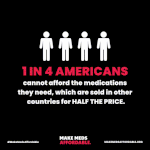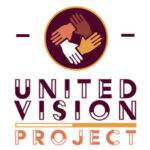- Like
- Digg
- Del
- Tumblr
- VKontakte
- Buffer
- Love This
- Odnoklassniki
- Meneame
- Blogger
- Amazon
- Yahoo Mail
- Gmail
- AOL
- Newsvine
- HackerNews
- Evernote
- MySpace
- Mail.ru
- Viadeo
- Line
- Comments
- Yummly
- SMS
- Viber
- Telegram
- Subscribe
- Skype
- Facebook Messenger
- Kakao
- LiveJournal
- Yammer
- Edgar
- Fintel
- Mix
- Instapaper
- Copy Link
Many of us have experienced that dread at the pharmacy, right before check-out, wondering how much a prescription will cost us, and if we have enough to pay for it. Some do. Others don’t, and have to weigh which takes priority: rent, food, or medicine. Millions of Americans who simply cannot afford the high cost of prescription drugs, ration, go without, stay sick, and some die. In the richest country in the world, That Ain’t Right! We can do better.
We are making some progress. The passage of the Inflation Reduction Act in 2022 included provisions for Medicare that expanded benefits, improved access to affordable treatments, and allowed for Medicare to negotiate lower drug prices.
On August 29th, the first ten prescription drugs were named that Centers for Medicare and Medicaid Services had selected for lower prices through Part D Medicare negotiations. The list includes some of the most expensive medicines in Part D:
- Eliquis – Prevention and treatment of blood clots;
- Jardiance – Diabetes; Heart failure;
- Xarelto – Prevention and treatment of blood clots; Reduction of risk for patients with coronary or peripheral artery disease;
- Januvia – Diabetes;
- Farxiga – Diabetes; Heart failure; Chronic kidney disease;
- Entresto – Heart failure;
- Enbrel – Rheumatoid arthritis; Psoriasis; Psoriatic arthritis;
- Imbruvica – Blood cancers;
- Stelara – Psoriasis; Psoriatic arthritis; Crohn’s disease; Ulcerative colitis;
- Fiasp, NovoLog – Diabetes.
Once implemented, 5 to 7 million more Medicare patients will save money on treating everything from diabetes to cancer and taxpayers can expect to save over $98 billion over the next decade. That is, if drug corporations stop slowing down progress through frivolous lawsuits.
That means people like my father would finally have some hope that the medicine he needs will be affordable rather than having to skip doses, ration medicine, or go into debt to buy prescriptions.
Dad has COPD, and was diagnosed with blood clots a few months ago. He pays nearly $300 a month for his Medicare Part D and MediGold coverage. To treat his COPD, he takes Flovent and Incruse, together costing over $200 a month. And, with his recent blood clots, Eliquis was added to his regimen. But last month, I had to pay for his refill because it was $136 for one month’s supply. Each of these medications are on the anticipated list of drugs whose prices are eventually to be negotiated for Medicare recipients, and Eliquis is on the first list of 10.
Making ends meet with rising property taxes, utilities, and the cost of groceries has been very difficult for anyone on a fixed income. Dad keeps doing without in order to make it work, and he’s not alone. We, as a nation, can and must do better.
Selecting these ten drugs was just the first step. Now, CMS will need to aggressively negotiate with drug corporations in order to arrive at fair prices that patients can afford. Negotiated lower prices would still allow these corporations to make a profit but without the relentless price-gouging that hurts patients and Medicare.
But lawsuits abound. Johnson & Johnson (Jansen), Bristol Myers Squibb, Merck and Eli Lilly/Boehringer Ingelheim and Pfizer/Astellas have made billions from overcharging patients, so they will keep doing all they can to delay and earn profits.
And speaking of price-gouging, Pfizer just spiked the price of Paxlovid to 100 Times the cost of production.
The good fight for making medications affordable for all continues.













